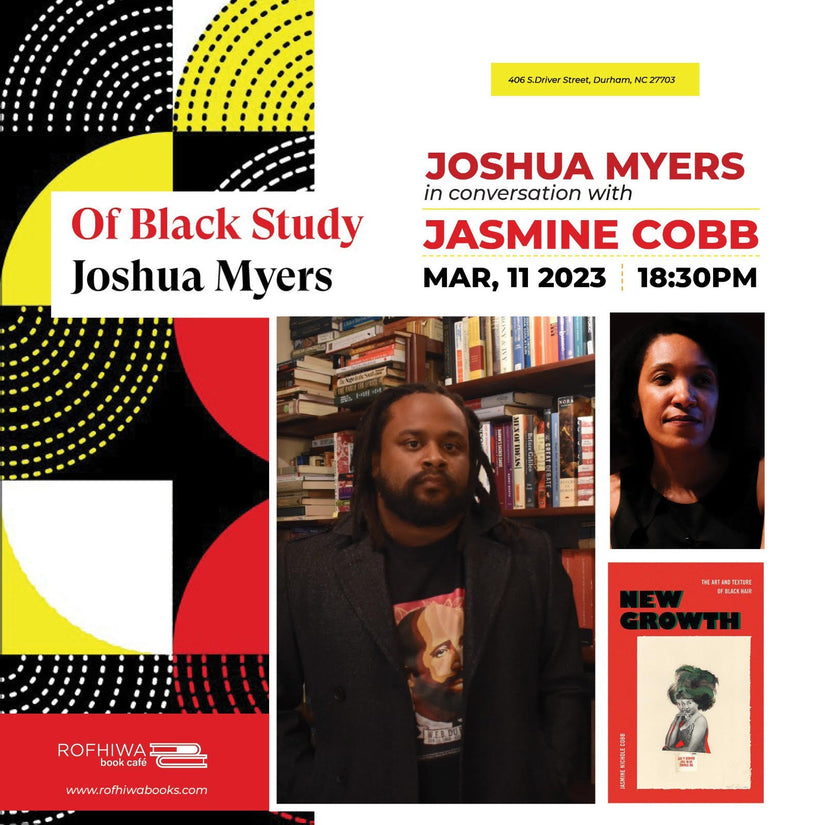
Save My Spot
We are thrilled to host Joshua Myers, author of Of Black Study, which explores the ideas of Black intellectuals who created different ways of thinking and knowing in their pursuit of freedom. Please join us as Joshua Myers, talks to Jasmine Cobb, author of New Growth: The Art and Texture of Black Hair which traces the history of Afro-textured coiffure as a visual material through which to reimagine the sensual experience of Blackness. This is an in-person event.
Registration:
We will offer seating for up to 40 in-person guests, with priority access given to those who purchase the book. To register for the in person in store event, click on "Save My Spot" and purchase your copy of the book and ticket. This will ensure that your seat is reserved on the day of the event.
About Joshua Myers:
Joshua M. Myers is an Associate Professor of Africana Studies in the Department of Afro-American Studies at Howard University. He is the author of Of Black Study (Pluto, 2023), Cedric Robinson: The Time of the Black Radical Tradition (Polity, 2021), and We Are Worth Fighting For: A History of the Howard University Student Protest of 1989 (NYU Press, 2019), as well as the editor of A Gathering Together: Literary Journal.
About Jasmine Cobb:
Jasmine Cobb is Professor of African & African American Studies and of Art, Art History and Visual Studies at Duke University, as well as a co-director of the “From Slavery to Freedom” (FS2F) Franklin Humanities Lab. A scholar of black cultural production and visual representation, Cobb is the author of two monographs, Picture Freedom: Remaking Black Visuality in the Early Nineteenth Century (NYUP 2015) and New Growth: The Art and Texture of Black Hair (Duke UP 2022). She is the editor for African American Literature in Transition,
1800-1830 (Cambridge UP 2021) and she has written essays for Public Culture, MELUS: Multi-Ethnic Literature of the United States, and American Literary History. Her third monograph in progress, The Pictorial Life of Harriet Tubman, offers a visual history of the abolitionist, from the middle nineteenth century through the present, including the persistence of the abolitionist’s image in contemporary art and popular culture. Professor of Africana Studies in the Department of Afro-American Studies at Howard University. He is the author of Of Black Study (Pluto, 2023), Cedric Robinson: The Time of the Black Radical Tradition (Polity, 2021), and We Are Worth Fighting For: A History of the Howard University Student Protest of 1989 (NYU Press, 2019), as well as the editor of A Gathering Together: Literary Journal.
About Of Black Study:
Of Black Study explores how the ideas of Black intellectuals created different ways of thinking and knowing in their pursuit of conceptual and epistemological freedom.
Joshua Myers explores the work of thinkers who broke with the racial and colonial logics of academic disciplinarity. Bookended by meditations with June Jordan and Toni Cade Bambara, the book focuses on how W.E.B. Du Bois, Sylvia Wynter, Jacob Carruthers and Cedric Robinson contributed to Black Studies approaches to knowledge production within and beyond Western structures of knowledge.
Especially geared toward understanding the contemporary evolution of Black Studies in the neoliberal university, Of Black Study allows us to consider the stakes of intellectual freedom and the path toward a new world.
About New Growth:
From Frederick Douglass to Angela Davis, “natural hair” has been associated with the Black freedom struggle. In New Growth Jasmine Nichole Cobb traces the history of Afro-textured coiffure, exploring it as a visual material through which to reimagine the sensual experience of Blackness. Through close readings of slave narratives, scrapbooks, travel illustrations, documentary films, and photography as well as collage, craft, and sculpture, from the nineteenth century to the present, Cobb shows how the racial distinctions ascribed to people of African descent become simultaneously visible and tactile. Whether examining Soul Train’s and Ebony’s promotion of the Afro hairstyle alongside styling products or how artists such as Alison Saar and Lorna Simpson underscore the construction of Blackness through the representation of hair, Cobb foregrounds the inseparability of Black hair’s look and feel. Demonstrating that Blackness is palpable through appearance and feeling, Cobb reveals the various ways that people of African descent forge new relationships to the body, public space, and visual culture through the embrace of Black hair.
Save My Spot
Export
Import
